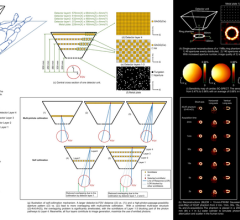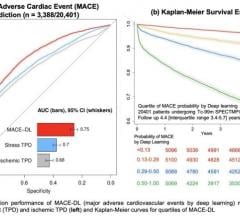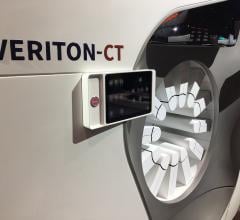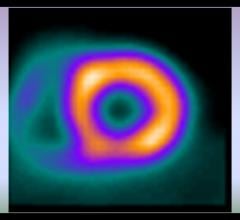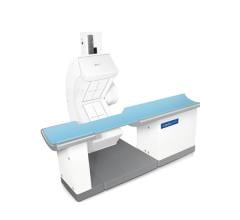April 1, 2009 - In a study comparing the ability of various medical techniques to accurately determine the extent of heart disease and stratify patients according to disease severity, researchers found that myocardial perfusion testing with gated single photon emission computed tomography (gated SPECT) was a more accurate predictor of prognosis in chronic ischemic heart disease (IHD)—a painful condition caused by a temporary reduction of oxygen-rich blood to the heart.
The research was published in the April issue of The Journal of Nuclear Medicine.
For the study, researchers selected a group of patients with known or suspected—albeit stable—IHD. Those with previous coronary artery bypass surgery, chronic kidney failure and hyperthyroidism were excluded, leaving 492 study subjects between the ages of 55 and 75. Each of these underwent a complete diagnostic work-up that included a medical history, physical examination, blood tests, electrocardiography at rest, two-dimensional echocardiography and myocardial perfusion imaging (gated SPECT) after stress and at rest.
Patients also underwent coronary angiography, which is currently the standard clinical procedure for diagnosing IHD, according to the American Heart Association. This invasive test is performed by inserting a catheter into the femoral artery of the leg and threading it into the aorta. A contrast dye is then injected, and X-rays record areas where narrowing or blockage in one or more coronary arteries has occurred.
During the next 37 months, patients returned for periodic examinations in an outpatient setting. Armed with the resulting data, the researchers determined that of the techniques investigated—including coronary angiography—gated SPECT is the best predictor of future cardiac events.
“The prognostic value of stress testing with myocardial perfusion imaging has been investigated for several years,” said Alessia Gimelli, M.D., at the Clinical Physiology Institute CNR, G. Monasterio Foundation in Pisa, Italy. “However, substantial changes in nuclear cardiology have occurred over the past two decades that have led to improved techniques. The clinical profile of patients with IHD has also changed, with patients often being older and affected by more diseases than in the past. We were therefore surprised to see that gated SPECT remains the best predictor of future cardiac events in patients with IHD.”
Furthermore, although left ventricular ejection fraction (the heart’s action of pumping blood into the body) is more commonly used in clinical practice to predict patient outcome, this study revealed that the extent of damage to the heart muscle—as shown in the SPECT images—is a better prognosticator of how patients will fare. This ability to identify individuals at risk for future cardiac events, such as heart attacks, has considerable appeal because the early initiation of preventive therapies may alter the course of the disease, noted the researchers.
“Risk stratification allows us to categorize patients according to the severity of their disease and risk of future cardiac events,” said Dr. Gimelli. “As a result, we are able to allocate resources where needed and treat the sickest patients more aggressively.”
Gated SPECT is a noninvasive nuclear medicine procedure involving an injection of a small amount of radioactive material that circulates in the bloodstream to show if the heart muscle is receiving adequate blood supply under stress and/or rest conditions, explained the researchers. SPECT imaging performed after stress reveals the distribution of the radiopharmaceutical and therefore the relative myocardial perfusion (blood flow in the heart) to the different regions of the heart muscle. The resulting set of SPECT images provides quantitative information regarding myocardial perfusion after stress and at rest, as well as the heart as it contracts.
Myocardial perfusion imaging stress testing is sensitive to even the most modest changes in blood flow and can determine whether the heart is receiving enough blood and oxygen. In this way, gated SPECT provides information regarding the presence of myocardial infarction and myocardial ischemia, explained Dr. Gimelli.
Co-authors of “Stress/Rest Myocardial Perfusion Abnormalities by Gated SPECT: Still the Best Predictor of Cardiac Events in Stable Ischemic Heart Disease” include Alessia Gimelli, Patrizia Landi, Paolo Marzullo, Giorgio Iervasi, and Daniele Rovai, CNR Clinical Physiology Institute, G. Monasterio Foundation, Pisa, Italy; Giuseppe Rossi, Unit of Biostatistics and Epidemiology, CNR Clinical Physiology Institute, G. Monasterio Foundation, Massa, Italy; and Antonio L’Abbate, CNR Clinical Physiology Institute, G. Monasterio Foundation and Scuola Superiore Sant’Anna, Pisa, Italy.
For more information: www.snm.org

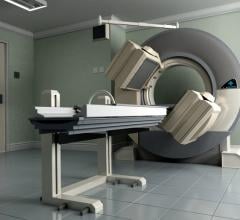
 June 05, 2023
June 05, 2023 

